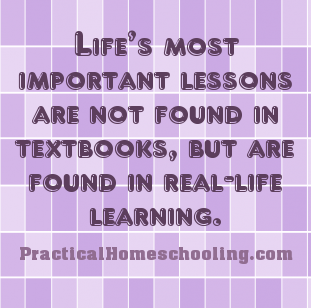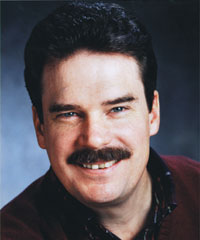Is Your Homeschool too “bookish”?
By Gregg Harris
Printed in Practical Homeschooling #2, 1993.
 Maybe we should use the flexibility of homeschooling to go beyond just "by the textbook"
Maybe we should use the flexibility of homeschooling to go beyond just "by the textbook"

| 
|
 Homeschooling a child through the junior and senior high school years
has been easier in some ways than homeschooling through the elementary
years. The reason is simple; once basic literacy is accomplished, they
are able to take more initiative in their studies. They are not like the
baby birds they once were, needing to have everything given to them bit
by bit. They are able to stretch their wings and search a few things out
on their own.
Homeschooling a child through the junior and senior high school years
has been easier in some ways than homeschooling through the elementary
years. The reason is simple; once basic literacy is accomplished, they
are able to take more initiative in their studies. They are not like the
baby birds they once were, needing to have everything given to them bit
by bit. They are able to stretch their wings and search a few things out
on their own.
When children develop this ability to think and study on their own, they
will begin asking questions that can only be answered adequately by
looking things up and getting out into the community to see and do
things firsthand. They will read academic books for pleasure and they
will be attracted to others who are interested in their studies. They
will desire to share their ideas with others and they will write their
thoughts down for their own sake, because they don’t want to forget
them, not because they are assigned to write something for school.
Simply put, homeschool children tend to become true scholars. That does
not mean they should be left alone with a stack of textbooks. They still
need ample direction from you. But they will definitely begin to “pass
you” in their studies, especially in those subject areas where they have
a special interest. In computer programming, math, history and science
teens can easily reach the college levels in their junior high years.
Mom and dad can easily become educational “bottlenecks” in this
process, if they insist on pre-reading and understanding everything
before they allow their student to study it.
Monitoring content for moral or factual error has to be more flexible
than it was in the student’s earlier years. If there is library work
going on (and there certainly should be) discuss secular ideas and
materials as you go. Challenge, in the light of God’s word, any ideas
you disagree with. As Paul said, “All Scripture is God-breathed and is
useful for teaching, rebuking, correcting and training in righteousness,
so that the man of God may be thoroughly equipped for every good work.”
(2 Tim. 3:16–17) Team up with your student to write the ultimate
refutation of evolution, or the false interpretation of the supposed
separation of church and state. Then publish your work for others to
read. That is scholarship.
You don’t have to know everything before you can effectively study it
with your children. Only God knows everything. But “it is the glory of kings
to search out a matter.” You have to be willing to learn as you go.
Getting Your Teen to Take Responsibility for His Education
Writing should be a major part of your teen’s school work. He should
study what you assign and then report back to you for tests and essays.
His time should be divided among various interests and activities, not
all of which are academic, but all of which will involve reading,
writing and presentation skills. Your baby bird will take flight and
begin to soar.
| “The tests our children will pass or fail
will be written in all the decisions
they make for the rest of their
lives.” |
That is what our Josh has done. At age 16, he was a full-fledged
delight-directed student, pursuing his higher education at home, still
under our supervision. Today he is 18, and still going full steam. He
studied hard and he took his tests at a reasonably rapid pace. His
grades were excellent. Sono and I no longer were the fountains of
knowledge for Josh that we used to be. Instead we served as his
librarians, his interested audience, his points of accountability and
the ones whose purses opened and closed in support or opposition to
Josh’s various “educational” expenses.
On that point let me make it clear that just because a student has a
mind of his own doesn’t mean he is ready to make all his own decisions.
Josh still needed boundaries, and clear assignments, just like any other
student. He had only the freedom he had shown himself able and willing
to handle faithfully. That was quite a bit. Today, Josh has completed
high school and is headed into his calling, publishing New Attitude
magazine and speaking in conferences. (He is really very good!)
The question so many ask is, “How did you organize Josh’s studies?” The
answer is, “we helped Josh organize them himself.” He was responsible to
organize his studies around his major interests, subject to our
approval. As long as his routines reflected good balance and proper
values, we usually said, “Go for it.” We wanted him to establish the
good routines that continue to guide him today.
The resources Josh has used in his preparation for life include many
things not found in books. Gymnastics, tennis, and weight-lifting
provided physical education. He changed diapers. He took piano lessons.
He did housework. He was taken out into the community to see how the
world really fits together. Field trips to the local business and
institutions of government are an effective way of integrating a lot of
other study. When I recently edited a new book about educational field
trips, I was pleased to realize how many places we had visited over the
years. These experiences are just as important as “book learning.”
Real-Life Learning
When Josh was old enough he traveled with me, sometimes speaking in my
workshops. At 17 he handled the wholesale accounts for CLW’s publishing
interests. He has done all the illustration work for all three of our
three House Rule Kits. He did a two week apprenticeship at a Christian
television production studio and then came home to convince us to make
an investment in the basic video equipment needed to start his own
wedding videography company. He was actively involved in various
evangelistic ministries and participated in the leadership core of the
church’s youth group. He occasionally threw parties for his friends (we
had over thirty-five at one birthday party). He enjoyed an active,
home-centered social life.
Life’s most important lessons are not usually found in textbooks. That’s
because we are preparing our sons and daughters to meet the future. As I
see it, that future will be dominated by basic things: marriage,
parenthood, business life, church life, and citizenship. Our
homeschooling efforts reflect the balance of all these things. Though
textbooks play an important part in this process, they are only a part.
The tests our children will pass or fail will not usually be on paper.
They will be written in all the decisions they make for the rest of
their lives. How they court their future spouse and maintain a lifelong
marriage, how they train their children, how they make a living, what
they believe about God and how they vote (if voting is still around) are
all part of our homeschool curriculum. We aren’t just teaching book
life, but family life.
Don’t Overdo the Books
If education for life is an apprenticeship, then children must have more
opportunities to walk with the wise, not less. “He who walks with the
wise grows wise, but a companion of fools suffers harm.” (Proverbs
13:20). We may not get to watch our children take these tests. But the
tests will come someday. As parents it is our responsibility to
orchestrate all the contributions wholesome experiences can make, and
then to narrate for our child what we believe these things could mean to
his or her future.
With that in mind, you can understand why I say it is important to get
some students’ noses out of the books. Homeschool routines can become
far too “bookish.” Josh could have graduated from high school a year
earlier. But we decided to put him to work in the office 20 hours a week
and launch him into his own part-time business. Books had to wait their
turn. Other things are also important. Reading what the wise had time to
write is just not enough.
That has been our approach with Josh, thus far. We want our son to do
things as well as read about things. We want him to always be “pumped.”
So far, it’s going pretty well.








